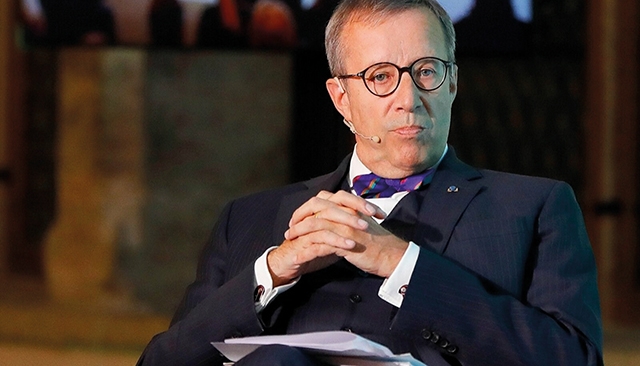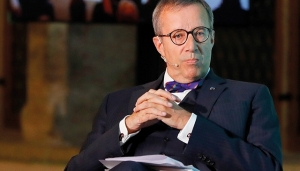“I have a hard time taking Sarkozy seriously” – President Ilves on the 2008 War
Former Estonian President Toomas Hendrik Ilves was one of a group of European leaders who came to Georgia and supported the country after the Russia-Georgia war in August 2008, and he has remained a staunch ally of Georgia and its Euro-Atlantic aspirations ever since. 12 years on, the Georgian Institute for Security Policy spoke with President Ilves on his views of the August War and its implications.
As one of the four European leaders who visited Tbilisi, what are your recollections of that visit, and what your memories over the years since?
Along with President Kaczynski, we decided that since people were not paying attention to what was going on in Georgia, that we would fly down ourselves; the Prime Minister of Latvia came up to Tallinn, and we then flew to Warsaw. President Adamkus joined us there with President Kaczynski, and then we flew to Simferopol, which is also currently occupied by the Russians, after which we were going to fly to Tbilisi. However, the Russians wouldn't give us permission to go through Georgian airspace, so we flew to Ganja, Azerbaijan, and then we drove 140 kilometers to the Georgian border, and switched cars and drove down without headlights from the mountains by moonlight, because we were advised against driving with our headlights on since the Russians would strafe or bomb potential targets on the road. We managed to get to Tbilisi, and almost immediately found ourselves in front of the crowd in front of the parliament building. We all gave speeches, and the massive crowd was clearly very happy to see us, but it was obvious that they were quite anxious about what was going on; after all, the Russians were only 30 kilometers from the capital. After that, we met President Sarkozy, who claimed to have found a solution which he would then denounce a month and a half later.
What was the solution?
That EU relations with Russia would be frozen until the Russian troops left. And then he found himself at odds with the sixth point of the proposal I guess, which was one of the most important points of the total six.
Radio Free Europe is publishing Sarkozy’s memoirs. In it, he states that Saakashvili really wanted to play on the nationalist sentiments of his compatriots and eventually “woke up the Russian bear.” What’s your take on President Sarkozy’s reflections?
I'm just looking at what his actions were, those actions with which he claimed he had achieved peace, and as I mentioned, the most important part of the six-point plan was the agreement that further EU cooperation with Russia would be frozen until the troops left; however, at a meeting of the European Council he had to admit that the proposal he had brokered did not envisage that part, and then it was decided largely due to French pressure not to suspend cooperation with Russia. He was the one who came out and said ‘Thank God common sense prevailed’: that's his quote, in fact. So, given his behavior, I really have a hard time taking much of what he said seriously.
For some, the ceasefire is still considered an example of successful Western negotiation to end the conflict. Do you share that view?
I didn’t think it was successful from the moment that he came out and backed off on that provision of the agreement. It might have been successful for six weeks, but since no Russian troops actually left, then I don’t believe it can really be dubbed a success. I rather think it's a spin on the part of people who want to believe it to be a success, because clearly the composite points were never met, and in fact he was the one who was against his own agreement. He might view it as a great success, but in fact he ended up torpedoing it himself. That is just not serious.
Twelve years is probably enough time to assess the real importance of that five day war which proved so disastrous for Georgia. What’s your take?
I'd say that in 2014, with Crimea and Donbass, it became clear that appeasing aggression just feeds the appetite of the aggressor; the unwillingness of the proverbial West and the failure of liberal democracies in the transatlantic area to meaningfully deal with the invasion of Georgia only showed Russia and Putin that he’d likely get away with it again, and, of course, since then it's only gotten worse: after all, currently we still have Ukraine in a deadlock. I'd say that some people learned something from 2008, then a few more people learned something from 2014, but not enough.
You don’t seem content with the Western response to these events, but what more could have been done?
More serious sanctions. Russia was seriously pushing for (and receiving) support for visa-free travel after 2008. Of course, after 2014 that stopped, but nonetheless I think the response to 2008 should have been far more robust. Russia, seeing no effective pushback, only became encouraged. The message of the so-called “reset” was 'it doesn't really matter that you invaded a country, we're going to try to have good relations anyway.'
Another very important event that led to it was the 2008 Bucharest Summit. Many view that not giving Georgia a membership action plan but instead a vague promise might also have prompted Russia to act. Had the MAP been delivered there, would it have given Russia second thoughts about invading Georgia?
I'm convinced that the message that came out of Bucharest was close to a dream for the Russians: they saw that the West was not going to give them what they wanted, therefore, they're not serious. They gave a message of ‘well, you'll someday be a member, but it could be 100 years from now’. It showed that the West was not serious, and I think that it was almost a green light for Russia’s decision to move against Georgia.
What do you think is the biggest lesson that the West should have learned from Georgia, and has it learned it?
Well, I don't know if Georgia wants to be a lesson; it's not a great thing to be a lesson. But they clearly did not learn the lesson, because the events of 2014 happened. I'm not sure they've learned much given that Macron was quite recently pushing to basically forget Ukraine in order to have good relations with Russia. Once again, it says “let's forget all of this bad stuff, let's get along with the Russians” - that's been the case so many times that it shows that people are not very good learners.
While it looks unrealistic to be able to solve Georgia’s occupied territories problem in the foreseeable future, what would your long-term approach towards it be?
With these kinds of issues, it’s very complicated. This is what I suggested to Saakashvili and to Ukraine: that if you forget the short-term, nothing will change unless we see a collapse inside Russia itself...that could happen, but anyway, without an internal collapse in Russia, what one needs to do is be successful domestically so that you are better than they are. That means successfully working at home: get Georgia’s domestic economy moving first and foremost. You need to get the economic side straight, because that's something you can alter. Clearly it was this economic success that changed people's minds, especially after 1997, when negotiations began with Estonia to join the EU. I was in the Foreign Ministry at that time, and had this dictum that we always have to be at least as good as Poland, because we knew that politically Poland would get in no matter what, but we had to be as good as Poland in everything. Therefore, when the decision came to begin negotiations with Poland, we could rightfully then say “and why not us?” whereas the predisposition of Europe or the European Union at the time was well “we'll take Poland, Hungary, the Czechs, and the Slovaks, but the Baltic states will come sometime later, if at all.” So, my message to Georgia right now would be to be very good when it comes to economics.
If we adjust your dictum to Georgia, what country should we look towards? You had Poland to measure your success; what country would that be in Georgia's case?
Romania, perhaps? You might even have higher democracy or corruption index rankings, but when it came to serious reforms in economic performance, Brussels looked at the numbers. I said we have to make sure that our numbers are good, and not good because we fix the numbers, but rather that they are genuinely good, that the numbers are legitimate: we have to get our performance to the point where we are taken seriously and that's why we were taken in and why we began negotiations. Once you begin negotiations, it's another long process, but even to get your foot in the door, you have to be good enough to get your foot in the door.
INTERVIEW BY VAZHA TAVBERIDZE













